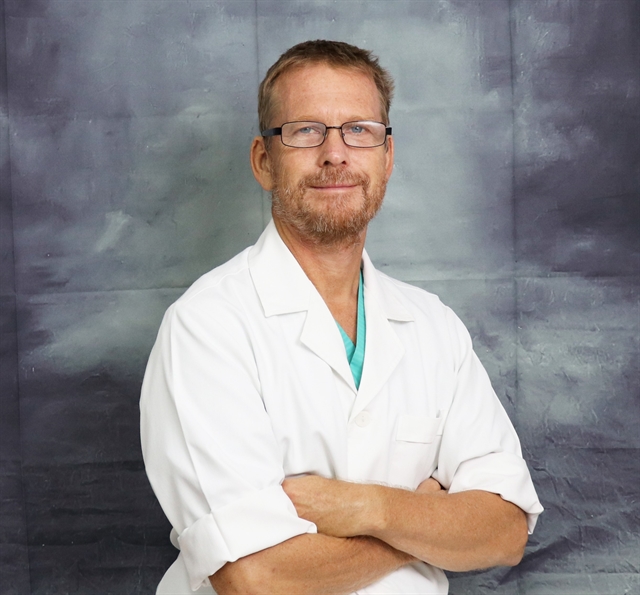 Life & Style
Life & Style


|
| Dr Mattias Larsson. Photo courtesy of Family Medical Practice |
Dr Mattias Larsson*
Access to high-quality healthcare is seen as a fundamental human right, however in many areas of the world it is a privilege. It can be challenging due to limited resources, inadequate diagnostic capabilities, and overuse of un-indicated treatments. Accurate diagnostics play a crucial role in improving patient outcomes and reducing healthcare costs, as the lack of diagnostic infrastructure often leads to misdiagnosis and inappropriate treatments. By providing skilled health staff and advanced diagnostic technologies, an international clinic can enhance diagnostic accuracy, thus guiding physicians towards targeted and effective treatments.
In low-middle income settings, medications like antibiotics or steroids are often overused due to limited access to reliable diagnostics under the motto: “If you don’t know what disease it is - treat everything!”. Diagnostics are expensive and time consuming whereas drugs, and especially antibiotics, are cheap and readily available. Unnecessary antibiotic use leads to the pandemic of antibiotic resistance. In Việt Nam, antibiotic resistance has reached epidemic levels, as explained in earlier articles. Steroids decrease the immune response and “mask” symptoms; hence the disease appears to improve but gets more severe. This often delays accurate diagnostics which in some cases may be very serious.
A clinic with international standards of care can provide quality examinations and good diagnostics enabling differential diagnostics between bacterial and viral infections as well as tests to verify specific pathogens the treatment can be targeted to the specific cause. One example is atypical pneumonia that presents with cough, fever, possibly headaches and difficulty of breathing. One common cause is mycoplasma pneumoniae, an intracellular bacterium that lacks cell wall. Common beta-lactam antibiotics such as amoxicillin do not work as they target the cell wall, so more specific antibiotics as macrolides are needed. Without accurate diagnostics, there is a high risk for in-accurate medication that does not work but has adverse effects such as diarrhoea.
Cancer, if detected early, is often more treatable and associated with better outcomes. However, in low-middle income settings, limited access to accurate diagnostics and specialised care hinders early detection efforts. An international clinic can contribute to improving cancer outcomes by implementing screening programmes, promoting awareness about early warning signs, and providing access to affordable diagnostic tests such as mammography, Pap smears, and colonoscopies.
Paediatric care requires specialised attention, as children have distinct healthcare needs and vulnerabilities. In low-middle income settings, there is often a lack of adequate paediatric healthcare infrastructure and limited access to specialised services. An international clinic can enhance paediatric care by providing comprehensive child care visits, immunisation programmes, and screenings for developmental disorders.
Chronic diseases, such as high blood pressure, require long-term management and follow-up to prevent complications and improve patients' quality of life. However, the continuity of care for chronic conditions is often disrupted due to various factors, including limited access to medications and regular monitoring. An international clinic can address this issue by implementing comprehensive chronic disease management programmes. This may involve establishing regular follow-up visits, providing affordable medications, and educating patients about self-care and lifestyle modifications. By ensuring consistent follow-up care, the clinic can effectively manage chronic diseases and reduce the burden on the healthcare system.
Providing Western standards of care involves not only accurate diagnostics and reducing un-indicated treatments but also emphasising the importance of follow-up care for chronic diseases, early detection of cancer, and specialised paediatric care. Of course, resource limitations are a significant hurdle in achieving Western standards of care. An international clinic must adapt its practices to the local context while maintaining quality and safety. This can involve implementing cost-effective interventions, streamlining care processes, and prioritising essential treatments. By utilising digital health technologies, such as telemedicine and electronic medical records, the clinic can optimise care delivery, improve patient access, and reduce unnecessary expenditures.
An international clinic can bring expertise, technology, and collaboration to improve healthcare outcomes. By prioritising holistic care and a patient-centered approach, as well as a strong focus on preventive measures, health education and lifestyle modifications can empower patients to actively participate in their own well-being. Family Medical Practice
*Dr Mattias Larsson is a pediatric doctor at Family Medical Practice and associate professor at Karolinska Institutet and has a long experience in research on infectious diseases. He has worked with the Oxford University Clinical Research Unit and the Ministry of Health of Vietnam. He is fluent in English, Swedish, Vietnamese, German and some Spanish.
Visit Family Medical Practice Hanoi 24/7 at 298I P. Kim Mã, Kim Mã, Ba Đình.
To book an appointment, please call us at (024).3843.0784 or via Whatsapp, Viber or Zalo on +84.944.43.1919 or email hanoi@vietnammedicalpractice.com.
FMP’s downtown location in Hồ Chí Minh is in Diamond Plaza, 34 Đ. Lê Duẩn, Bến Nghé, district 1, Thành phố and 95 Đ. Thảo Điền, district 2. Tel. (028) 3822 7848 or email hcmc@vietnammedicalpractice.com.




